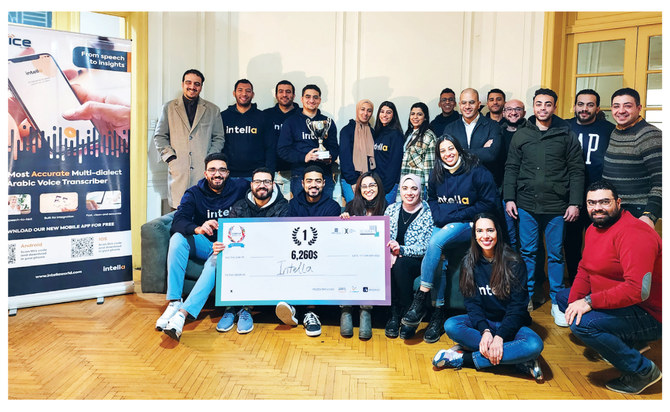CAIRO: Speaking exclusively with Arab News, Nour Taher, CEO and founder of the company, said Intella has begun relocating its headquarters to the Kingdom after gaining massive traction in the country.
The move is evidence of how Saudi Arabia is making strides in the field of artificial intelligence and positioning itself at the forefront of the AI revolution in the Middle East.
“Saudi is becoming a hub for tech companies, and we plan on playing a core role in the Saudi tech ecosystem,” Taher said.

Nour Taher
“Saudi Arabia is currently our largest market with 70 percent of our business coming from there. We have just taken the decision to relocate our HQ there to better serve our existing clients and further expand our business. We are also inspired and aligned with Saudi Arabia’s Vision 2030,” she added.
Intella is one of the region’s leading deep tech companies that aspires to create Arabic-language AI technology that caters to a vast range of dialects.
“Our mission is to capture voice data and convert it into text, which we then analyze and mine for valuable information,” Taher explained.
AI-Powered products
The company offers a wide range of products in the areas of voice transcribing, data mining, and AI-powered insight capturing.
“Our unique advantage lies in our ability to amass vast datasets, which we continue to expand with every conversation captured. By harnessing the power of technology, we are able to reveal insights and patterns that might have been impossible to detect through traditional means,” she explained.
Intella offers Intella Contact Center Intelligence, a transcribing then analyzing tool for call centers; Intella Surveys, a real-time insight-capturing tool for businesses; and Intella Voice, a multi-dialect Arabic voice transcriber which averages a 95.7 percent accuracy rate covering 25 dialects.
“We transcribe different Saudi dialects such as Najdi, Hejazi, Gulf and Faifi with an accuracy exceeding 95 percent, even when multiple dialects are intertwined within the same conversation,” Taher explained.
Opportunities Ahead
Intella has already cemented its position in the Kingdom with a majority of its client base coming from Saudi Arabia as well as landing multiple partnerships.
Taher explained that the company’s AI products are suited for contact centers, government bodies, businesses, media agencies, and educational institutions.
FASTFACTS
Intella won the Startup World Cup regional competition last February and will be heading to Silicon Valley to compete in the grand finale for a $1 million prize.
Saudi Arabia has positioned itself as a cornerstone for AI development in the region, with multi-billion dollar investments and initiatives set to reshape the sector.
The Kingdom established the Saudi Data and Artificial Intelligence Authority back in 2019 to drive national data and AI to transform the country as a leading data-driven economy.
Saudi Arabia has also set its sights on being ranked among the top 15 nations in AI by 2030.
“We have hundreds of active partnerships, in Saudi Arabia we are working very closely with governmental entities, consulting firms, tech companies, and contact centers. We have also secured global and regional partnerships with big tech companies like Huawei and Microsoft,” Taher stated.
Taher believes that the Kingdom holds a massive opportunity for AI adoption. She stated that the company’s products were built for businesses and institutions to capture solutions and expand on them.
“The most exciting part at Intella is that we’re not trying to build solutions alone. The first thing we’ve done when we built our model was avail it through API integration for other parties to integrate with and build on top of,” she said.
“Saudi Arabia is becoming a tech hub and is attracting a lot of regional and global tech players, hence empowering everyone with accurate multi-dialect transcription could mean that every single conversation turns into meaningful insights,” she added.
With Saudi Arabia opening to the world, Arabic speaking individuals are heading to the Kingdom to take hold of the opportunities presented by the trillion-dollar economy. “What’s interesting about the Saudi market for us is that Arabic is the main spoken language and even the expats in Saudi are predominantly Arab, so we believe the country is in line with our vision of bridging the gap between global AI advancements and the Arab-speaking world,” Taher emphasized.
“We’ve also seen an increasing demand from Saudi media and podcast companies who are using our self-service platform to obtain transcripts for their voice content to boost their search engine optimization,” she added.
Taher aims to position Intella as a market leader in the Saudi space as she stated that the company is actively hiring in Riyadh across a wide range of roles.
“We are currently 29 and we’re expecting to double this year with the majority of the new hiring happening in our Saudi office,” she added.
Operating a Software-as-a-Service business model, Intella has been profitable since its inception in 2021 but has been heavily investing in research and development, Taher claims.
“We have already quadrupled last year’s revenue in the first 5 months of this year,” she said.
In terms of funding, the company secured a $1 million investment last year through a funding round led by Hala Ventures, in addition to “wrapping up a larger round which will be announced soon,” Taher said.
Furthermore, Intella won the Startup World Cup regional competition last February and will be heading to Silicon Valley to compete in the grand finale for a $1 million prize.
Saudi Arabia has positioned itself as a cornerstone for AI development in the region, with multi-billion dollar investments and initiatives set to reshape the sector.
The Kingdom established the Saudi Data and Artificial Intelligence Authority back in 2019 to drive national data and AI to transform the country as a leading data-driven economy.
This includes the development of Saudi Arabia’s National Strategy for Data and AI, which was launched in 2020 with the aim of attracting $20 billion in investments for AI initiatives, training 20,000 data and AI specialists, and certifying 100,000 Saudi citizens in the sector by 2030.
Moreover, Saudi Arabia has set its sights on being ranked among the top 15 nations in AI by 2030.
Another major attraction is the Kingdom’s giga-project NEOM, intended to be a smart city powered by AI, machine learning, and other variations of advanced technology.
















